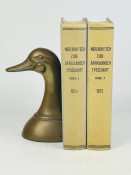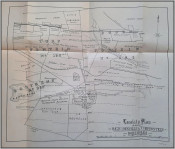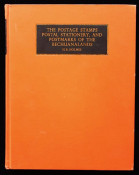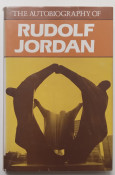[David HUME, Baron Hume of Ninewells (1757–1838), and others]. - Sir Archibald Gordon KINLOCH of Gilmerton (c. 1749 – 1800)
[Diminished responsibility] The Trial of Sir Archibald Gordon Kinloch, of Gilmerton, Bart: For the Murder of Sir Francis Kinloch, Bart., His Brother-German, Before the High Court of Justiciary on Monday June 29, 1795. Taken in short hand, - and carefully revised by the counsel. Edinburgh: printed by C. Denovan, for J. Elder, and G.G. & J. Robinson of London, 1795.
Octavo (9 x 5 1/2in; 228 x 140mm). Half-title, uncut. (Marginal repairs to pp. 121/122 and 123/124, some old light dampstaining. Late 19th-century cloth, titled in gilt on spine (lightly rubbed and bumped).
A landmark case argued by Lord Hume and others. “Although the term is not used during the proceedings, the 1795 trial of Sir Archibald Gordon Kinloch for the murder of his brother Sir Francis Kinloch, 6th baronet of Gilmerton under Robert McQueen, Lord Braxfield is one of the earliest clear examples of recognition of diminished responsibility. Whilst found guilty, and usually expecting a death sentence, not only was Kinloch sentenced to life imprisonment instead, but two days after the judgement (17 July 1795) the accused was released into the care of a doctor (William Farquharson) on the understanding that Kinloch be kept in a secure environment (the doctor's own house).” (wikipedia)
“Sir Archibald Gordon Kinloch of Gilmerton (c. 1749 – 1800) was a Scottish baronet who, in one of the most celebrated cases in late 18th century Britain, murdered his elder brother, Sir Francis Kinloch, 6th baronet of Gilmerton. In the approach to the tragic events (and during the trial) he was known by his military title of Major Alexander Gordon Kinloch (close acquaintances call him Major Gordon). Through the greatest of ironies, due to the murder, Kinloch was thereafter entitled "Sir". Although the term is not used during his trial, it is one of the first recorded instances of Diminished responsibility due to mental instability. The case also set parameters for the use and validity of notes taken by witnesses in use as testimony.
He therefore became a baronet on 16 April 1795 the day of his victim's death. The entirety of his baronetcy was spent either in prison or under house arrest, neither being a barrier to his legal rights to the title of Baronet.His trial included many prominent legal and medical persons of late 18th century Edinburgh society.…
The trial took place on 30 June 1795 in the Edinburgh High Court. The jury comprised 15 men from the Edinburgh area, including several "gentlemen" to best equate to peers of the baronet.
The trial was held under Lord Justice Clerk, Robert McQueen, Lord Braxfield, presiding over: David Rae, Lord Eskgrove; William Nairne, Lord Dunsinane; John Swinton, Lord Swinton; and William Craig, Lord Craig.
The prosecution was led by Robert Dundas of Arniston. Robert Blair (later Lord Avontoun) was Solicitor General, John Burnet was Advocate and Hugh Warrender was Agent.
For the defence David Hume led Kinloch's defence team, aided by three further advocates: Charles Hope (later Lord Granton); William Rae; and David Monypenny (later Solicitor General for Scotland. Kinloch pleaded not guilty after the reading of the charge of murder. His brother-in-law Sir Foster Cunliffe, and cousin, James Wilkie of Foulden, stood with him through the trial.
Witnesses (family, friends and servants) attested to Archibald's insanity but, in general, the medical witnesses did not consider him insane. Much blame was placed on the servants for not being there to assist in the disarming of Archibald. …
The Lord Justice in his summary asked the jury to consider whether the acts might be the result of madness as a malady or temporary madness caused by drunkenness. He clarified that the law saw drunken madness as a "voluntary contracted madness" requiring judgement as though the person be in their right senses. It was not disputed that a murder had occurred, the issue was to consider If Archibald was insane at the time.
The jury, led by Andrew Wauchope, found Kinloch guilty, but was considered temporarily insane.
The judgement was read by the Lord Justice Clerk on 15 July 1795. The accused (referred to in the trial as the 'pannel') was unanimously declared guilty. However, they declared him insane and 'not an object of punishment'. This saved him from the death penalty. He was sentenced to life imprisonment in the Tolbooth. An odd rider on the sentence allowed any person to secure his release on payment of £10,000 and on upon promise of holding him securely in another place (effectively allowing a house arrest). Dr William Farquharson approached Lord Braxfield on 17 July and successfully secured Kinloch's release into his own care. It is not clear if the required bond was paid. If so it equates to around £5million by current (2016) standards. “(Wikipedia).
- Binding Condition: later but acceptable
- Overall Condition: acceptable
- Size: 9 x 5 1/2in; 228 x 140mm
- Sold By: Shadowrock Rare Books
- Contact Person: Adam Langlands
- Country: United States
- Email: [email protected]
- Telephone: 001-860-248-1547
- Preferred Payment Methods: Paypal, US$ checks and wire transfers, major credit cards through paypal
- Trade Associations: AA Approved

Similar lots in the current auction View all
Click on an item to view more details and to bid.











































